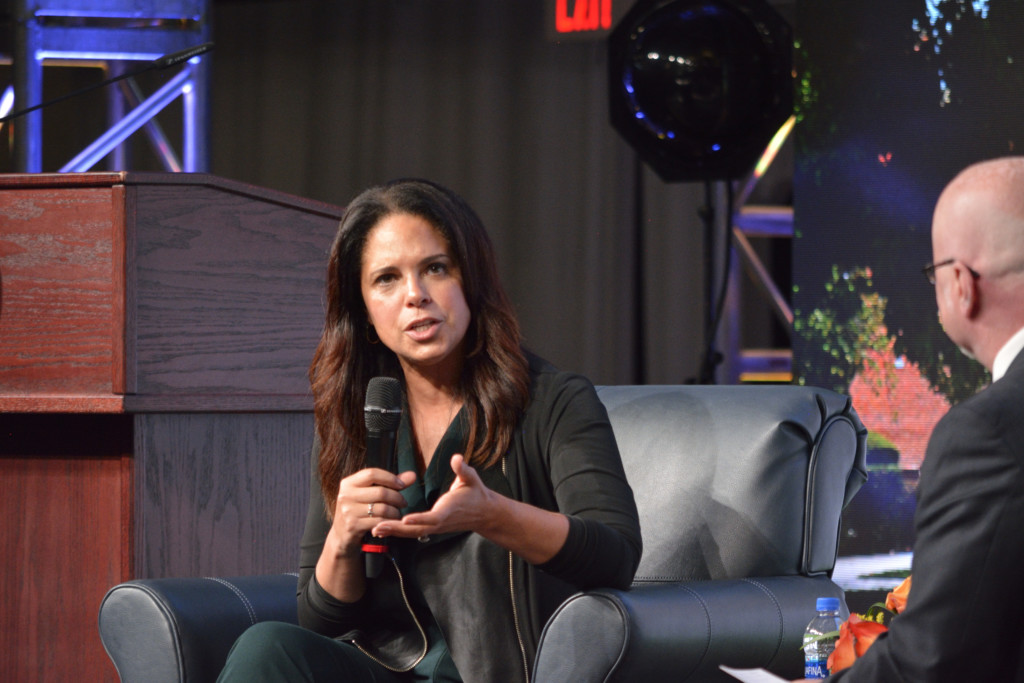Award-winning journalist Soledad O’Brien talked about how to make storytelling more “human” in her keynote speech on Oct. 6 during Meliora Weekend.
O’Brien, who now serves as the CEO of Starfish Media Group, began by reminiscing on her early days in the journalism industry, and the lessons she learned then.
In particular, she recalled that many of the stories she covered early in her career were overly sensational, often to the detriment of context and nuance.
“We were covering a dramatic headline,” O’Brien said to a packed Palestra.
She expanded on this theme by tying it to her experience with media coverage of race, class, and gender, referring to them as topics often known as the “third rail” in the media world.
“Poor people were just poor,” O’Brien said. “When we talk about [them], they become a compilation of their deficits,” she continued, going on to contrast the way in which writers often framed stories about poor people of color by exposing their dysfunction, whereas stories of the white middle class were given more humanity.
O’Brien is the child of an interracial couple who met in Maryland when interracial marriage was still illegal. She seeks to rectify inequalities she has always been cognizant of with her media coverage. However, her parents never painted these injustices as struggles.
To illustrate, O’Brien told the story of her parents’ first date, when no restaurant would agree to serve them together. Her father, a white Australian, was more than welcome to enter, but O’Brien’s mother, black and Cuban, was not.
Though the theme of racial discrimination was more than apparent, O’Brien said her mother’s solution to this dilemma was to cook at home for their dates.
Growing up with a multiracial family in a white suburban neighborhood led O’Brien to quickly realize that “there is no one American look.”
She credits this as her motivation for much of the work she did as she began to climb in her career as a TV journalist who specialized in talking about the uncomfortable, with works such as “Black in America,” “Latino in America,” and “The Women of 9/11” to her name.
In line with the popular writing adage “show, don’t tell,” O’Brien did not simply talk about her experience increasing media representation — she also prepared several clips to illustrate how powerful these types of stories could be.
As O’Brien wrapped up her speech, two-thirds of the crowd were on their feet.
Audience members like Ted and Bonnie Voll, one couple for whom O’Brien has become a household name, heard her message loud and clear.
Ted’s goal after listening to O’Brien that day, he said, was “to be a listener.”
“I sometimes tend to go only to the places I’m comfortable,” he admitted, “but I’m ready to open myself up more.”
Bonnie, who holds O’Brien in high regard for always reporting on the person rather than the story, said O’Brien’s speech gave her “validation for why [she] turn[s] off the screaming matches on TV,” and supported O’Brien’s push for media to focus less on drama and more on detail.
Other members, like alumni couple Brian Rea ‘03, Warner ‘05 and Jessica Guzmán-Rea Warner ‘10 appreciated how O’Brien consistently used her platform to highlight issues of social justice.
“People matter, stories matter,” Guzmán-Rea said.
Overall, the attendance of her headlining event proved O’Brien was right to say that “people are interested and want to understand each other, especially with good storytelling.”



